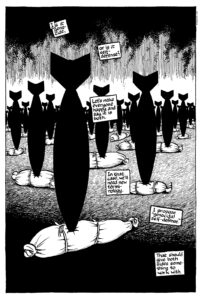
Gary Groth
We both understood that in this context we inhabit a privileged world of heightened cultural responsibility—he as an artist, me as a publisher—that compelled us to do something, but we also felt a sense of futility and frustration. How should we best exercise this cultural responsibility? On December 26, I wrote Joe, “I decided that I cannot in good conscience watch what’s unfolding in Gaza without public comment.” A few days later, in an email to me, he wrote, “When I think of what can be done, your strength lies mainly in your position as a publisher and what you publish. And mine as a cartoonist and what I draw. I’ve been going back and forth a lot about what, if anything, I can contribute.” The result of this conversation led us to take two courses of action: a statement from the publishers of Fantagraphics, released publicly yesterday and reproduced below, and this column, “The War on Gaza,” a series of graphic commentary and reflections by Joe Sacco that he will draw as often as time permits. It is surely not enough, but it’s what we can contribute
Considering that we have believed in the deeply humanistic perspective of this book, that we have considered it our responsibility to keep it available to the public continuously in 25 printings in 31 years, and that we have boundless respect for its author, we consider it a moral imperative to make our position on the current “Israel-Hamas/Gaza war” publicly known.
We want to state clearly and emphatically that we stand with the innocent people of Gaza. At the same time, we emphatically condemn the massacre of innocent Israeli civilians by Hamas on October 7 as a war crime and acknowledge with deep regret the grief and trauma Jewish people are enduring in its aftermath; but this barbarous act does not warrant Israel to commit its own war crime and to inflict exponentially greater grief and trauma in return.
Finally, as citizens of the United States, it is both emotionally agonizing and morally objectionable to watch our nation’s complicity in the ongoing genocide of Gaza. We respectfully submit that:
• There should be an immediate ceasefire
• Israel should immediately allow humanitarian aid into Gaza
• Israel must end its apartheid regime
• Israel must stop looking the other way as West Bank settlers murder Palestinians
• Israel’s illegal West Bank settlements must be dismantled
• Negotiations in good faith must begin toward a two- or single-state solution in which both Israelis and Palestinians share the same sovereign rights.
• Israeli and Hamas prisoners/hostages should be released
• Those who speak out on behalf of Palestinians should not be silenced, retaliated against, or smeared as antisemitic
• Slippery new terms like “humanitarian expulsion” and “voluntary migration” should be denounced for what they are – oxymoronic euphemisms for ethnic cleansing
• War crimes should be investigated and vigorously pursued by the International Criminal Court and the International Court of Justice
“Before the terrifying prospects now available to humanity, we see even more clearly that peace is the only goal worth struggling for. This is no longer a prayer but a demand to be made by all peoples to their governments – a demand to choose definitively between hell and reason.”
— Albert Camus, Combat, 1945
Altre iniziative e in questo caso collettiva è nata in Italia da molti fumettisti e disegnatori superando i confini per arrivare fino al Giappone.
Dall’immagine de Handala, decine di fumettisti italiani hanno ritratto i loro personaggi di spalle nella stessa postura di Handala, il risultato un magnifico manifesto colorato pieno di storie con al centro quella di Handala, la storia e l’attualità della Palestina.
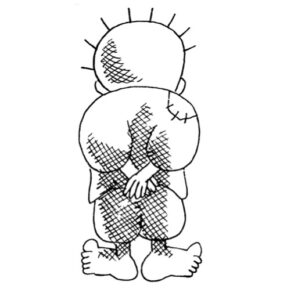
A fine novembre dello scorso anno, Eris Edizioni e i fumettisti Francesca Ghermandi e Hurricane Ivan hanno ideato una iniziativa volta a sensibilizzare verso la richiesta di un cessate il fuoco in Palestina, alla quale hanno partecipato 80 disegnatori e disegnatrici. Ora, l’iniziativa si è allargata anche al Giappone e ad altri Paesi.
Gli 80 partecipanti italiani (qui c’è la lista completa degli autori) avevano rappresentato 104 personaggi di spalle vicino a Handala, l’iconico bambino disegnato di Naji al Ali, divenuto simbolo della resistenza all’occupazione israeliana in Palestina (qui c’è un articolo per saperne di più). I personaggi erano contenuti all’interno di un poster, che è stato poi pubblicato in allegato a un numero della rivista Internazionale.
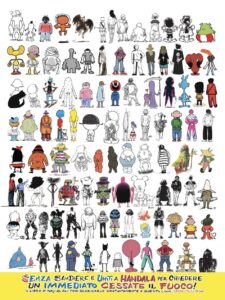
Il 31 dicembre 2023 il mangaka Tokushige Kawakatsa, l’artista Mariko Matsushita e la fotografa Zohre Miha hanno rilanciato ulteriormente l’iniziativa, chiedendo ad autori giapponesi e non solo di disegnare anche loro un proprio personaggio nella posizione di spalle come Handala. Il post di lancio sul profilo X di Tokushige Kawakatsa ha raggiunto oltre 2 milioni di persone, e da lì hanno fatto seguito centinaia di contributi, che è possibile rintracciare seguendo l’hashtag #withHandala.
Nei giorni successivi, l’iniziativa è stata poi ripresa anche da autori di altri Paesi, e i nuovi post continuano tuttora a susseguirsi. Intanto, Eris Edizioni ha inoltre reso disponibile in download gratuito sul proprio sito il volume Filastin, dedicato a Naji al Ali e pubblicato originariamente nel 2013.

“L’eroica resistenza del popolo palestinese contro la Nakba in corso: l’occupazione e la pulizia etnica della Palestina storica da parte del regime israeliano. Sosteniamo fermamente il diritto al ritorno dei palestinesi nella loro patria – dal fiume al mare – e riaffermiamo il nostro impegno a porre fine agli aiuti statunitensi a Israele, che ammontano a quasi 4 miliardi di dollari all’anno” cit. Manifesto FPLP
Cosi recitava una parte del manifesto politico del Fronte Popolare per la Liberazione della Palestina.
Era l’inizio del risveglio, dell’Intifada della fine degli anni 80′
Mille storie, tanti morti, tanta sofferenza, terre rubate, omicidii mirati, arresti, case distrutte o requisite, la questione palestinese non è mai stata risolta. In quegli anni gli attacchi repressivi, violenti, brutali compiuti dall’IDF e dai coloni non ha mai spezzato la schiena dei palestinesi, la resistenza non si è mai fermata come vinta ma si è rimodulata in un contesto storico, politico economico in evoluzione.
La solidarietà è sempre stata a fianco del popolo palestinese, nel contesto dell’arte e del fumetto è da segnalare, forse la prima, importante iniziativa dei fumettisti italiani: Kufia: Matite Italiane per la Palestina.
Articolo pubblicato su Sovranità Popolare


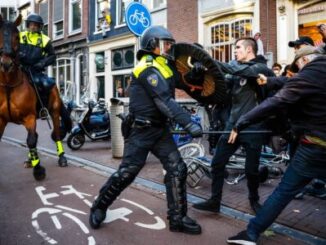
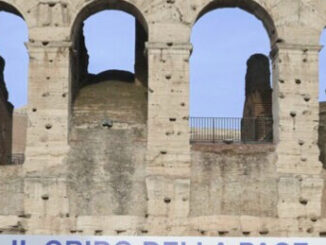
Commenta per primo